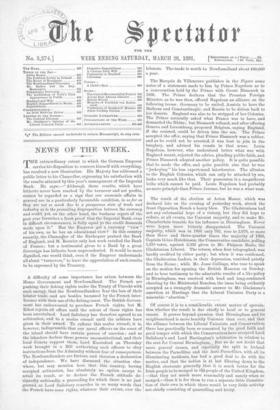A difficulty of some importance has arisen between the Home
Government and Newfoundland. The French are pushing their fishing rights under the Treaty of Utrecht with *inch energy, that the Newfoundlanders fear the loss of their lobster trade, and are besides harassed by the French inter- ference with their use of the fishing-coast. The British Govern- ment has endeavoured to purchase French rights, but M. Ribot rejects all offers until the extent of those rights has been ascertained. Lord Salisbury has therefore agreed to an arbitration, and to a modus vivendi until the arbiters have given in their award. To enforce this modus vivendi, it is, however, indispensable that our naval officers on the coast of the island should have certain powers of coercion ; and as the islanders declare these powers unconstitutional, and their local Courts support them, Lord Knutaford on Thursday week brought in a Bill authorising such officers to obey instructions from the Admiralty without fear of consequences. The Newfoundlanders are furious, and threaten a declaration of independence. We have discussed the situation else- where, but may mention here that this country, having accepted arbitration, has absolutely no option except to await its result, or to declare the French attitude de- signedly unfriendly, a proceeding for which there is no just ground, as Lord Salisbury concedes in 'so many words that the French have some rights, whatever their extent, over the lobsters. The trade is worth to Newfoundland about £60,000 a year.


































